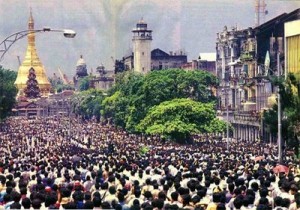6-12 August: 24 Years On: Still No Accountability
August 13, 2012 Across the country, on 8 August, commemorations were held to mark the 24th anniversary of mass protests when the people of Burma stood up to a repressive and violent regime in 1988. Sadly this was not the last mass protest to occur and the human rights violations and unjust imprisonment, which spurred the 8.8.88 demonstrations, continue today.
Across the country, on 8 August, commemorations were held to mark the 24th anniversary of mass protests when the people of Burma stood up to a repressive and violent regime in 1988. Sadly this was not the last mass protest to occur and the human rights violations and unjust imprisonment, which spurred the 8.8.88 demonstrations, continue today.
As a response to the demonetizations in 1985 and 1987 that wiped out the savings of families throughout the country, catastrophic mismanagement of the economy and military domination in national politics with ongoing human rights abuses, demonstrations began against the military government. Over the coming months there would be continued protests in all the major cities of Burma reaching a climax in August of that year. By the time the regime regained its control, over 3,000 unarmed citizens were killed and thousands more had been imprisoned and tortured.
The anniversary of 8.8.88 reminds us that the demands and frustration of 24 years ago are still present. Despite the publicized release of a few hundred political prisoners, hundreds remain behind bars and politically motivated arrests are ongoing. The Assistance Association for Political Prisoners counts 448 political prisoners still incarcerated while many more are still being verified. The government still arrests its critics and anyone suspected in the frame of ‘national security.’ Torture continues to be used to elicit false confessions.
On 7 July, of this year the authorities pre-emptively arrested 20 student leaders and political activists in order to prevent them from highlighting another seminal event in Burma’s history, the 50-year anniversary of the massacre of students by the Ne Win-led military regime and the subsequent bombing of the student union building at the University of Rangoon.
The human rights abuses occurring 24 years ago are still occurring today such as the killings, rape, and mass arrests of Rohingya Muslims after failing to protect both the Rohingyas and Arakan Buddhists during the violence in western Burma. In Kachin State actions that amount to war crimes and crimes against humanity are perpetuated by the Burma Army but sadly have not been reported and have not received attention or assistance to a similar extent. In the ongoing conflict that has displaced over 60,000 people, there have been reports of government forces burning villages, torture and the rape and killing of civilians.
Finally the 8.8.88 anniversary reminds us that past actions have not been atoned for, past violations remain unaddressed. The accountability of the regime is as absent today as it was 24 years ago. Government Ministers Aung Min and Soe Thein were present at the anniversary ceremony in Mandalay. In addition to being present they donated 200,000 kyat to the monks at the monastery where the event was held and 1,000,000 kyat to the 88 Generation Students Group.
It is difficult not to view these actions with a degree of cynicism. A token donation does not absolve the government of past crimes. The continued abuses suggest an attempt to buy forgiveness without making a real attempt at reconciliation or exercising accountability in past actions. This quick fix approach does not address the real need for accountability, political reform, the release of political prisoners, and an end to human rights violations. Easy promises and unethical incentives will not solve the fundamental problems or lead to meaningful reconciliation; this is a poor substitute for good faith and transparency. International governments must ensure that their assistance to the ‘reformist government’ of Thein Sein does not provide the regime immunity. Fundamental change requires an honest look at past and present actions. The UN Special Rapporteur has called for a truth commission; we encourage strong international support for this real step towards accountability and reform.
News Highlights
Daw Aung San Suu Kyi meets with President Thein Sein for the third time and is named chairperson of Parliament’s new “Rule of Law and Stability Committee”
Inside Burma
Violence flares up again in Arakan State; President Thein Sein meets with Arakan leaders
The National Human Rights Commission travels to Myitkyina and Waingmaw, Kachin State
Burma Army troops assault a Kachin woman in northern Shan state; the Kachin Independence Organization plans refugees repatriation following China’s request while Diarrhea outbreaks occur in Kachin IDP Camps
Four members of the government’s Border Guard Force are killed in a clash with the Karen National Liberation Army while the Karen National Union says the government is avoiding real political dialogue
Government agrees to lift suspensions on two weekly journals and announces it has formed an already criticized new 20-member interim press council called the Myanmar Core Press Council
Pepsi to re-enter Burma market
Regional
ASEAN offers humanitarian assistance for Arakan State; Burma invites the Organization of Islamic Countries to visit Arakan State
International
UN warns that humanitarian needs are growing for thousands of displaced persons in Burma and urges Bangladesh to ensure NGO access for people fleeing Rakhine state
Opinions
Is Burma Ready to Embrace Diversity?
By Benedict Rogers
Democratic Voice of Burma
Burma Lets the Rohingya Burn
By Matthew F. Smith
The Wall Street Journal
Latest from the Blog
UN Special Rapporteur Calls for Investigations, Accountability and Reconciliation in Burma
By Burma Partnership
Actions
Labour activist is arrested in Mandalay after organizing a protest
Statements and Press Releases
No Political Activists Must Remain in Burma’s Jails: Free Zaw Zaw Aung
By Burma Campaign UK
Statement by Commissioner Georgieva on Humanitarian Access to Rohingya and Other Affected Communities
By European Commission
This post is in: Weekly Highlights









 All posts
All posts